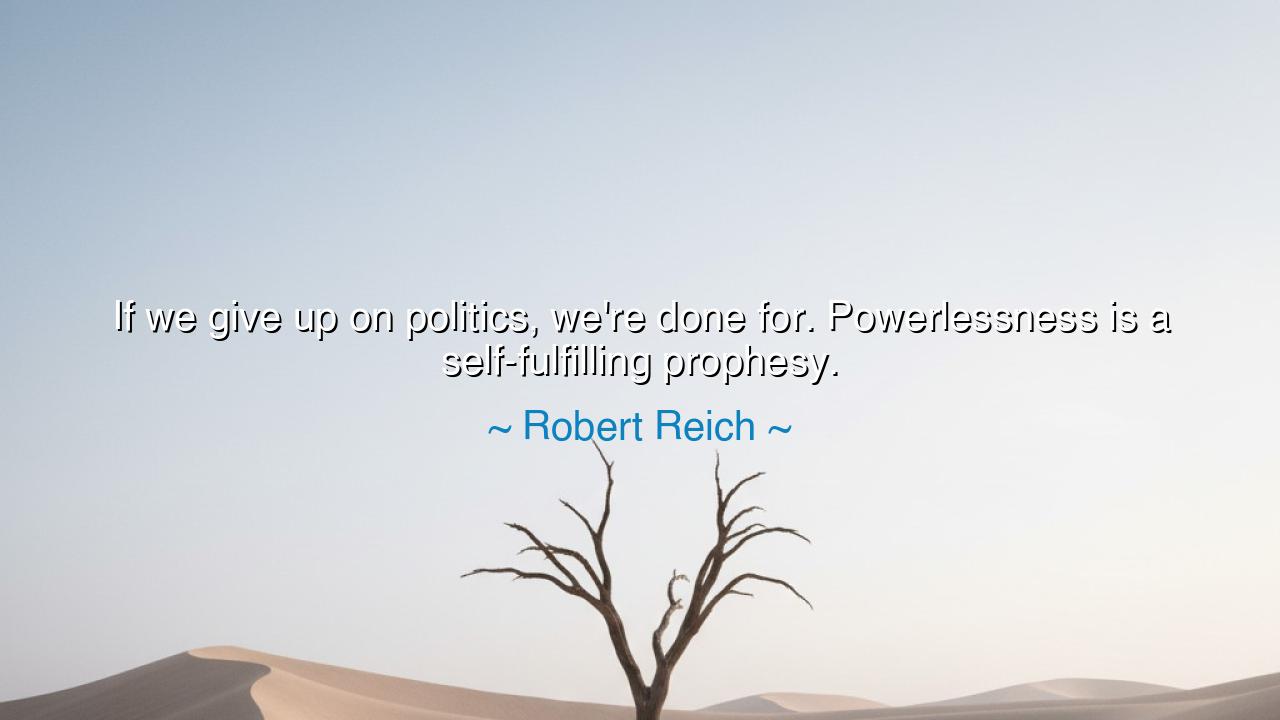
If we give up on politics, we're done for. Powerlessness is a
If we give up on politics, we're done for. Powerlessness is a self-fulfilling prophesy.






O children of the future, hear the words of Robert Reich, for in them lies a profound truth: "If we give up on politics, we're done for. Powerlessness is a self-fulfilling prophesy." In these words, he speaks of a great and timeless struggle—the battle for power, for control over our destiny. To turn away from politics is to surrender to the forces that seek to shape the world without our consent. For when we abandon the realm of decision-making, when we relinquish our voice in the shaping of the world, we set in motion a cycle of powerlessness that will consume us, a prophecy written by our own neglect.
In the ancient cities of Athens and Rome, the citizens knew well the importance of politics—the delicate balance of power between the rulers and the ruled. When the people abandoned their duty, when they grew complacent or fearful, the forces of tyranny often rose to fill the void. Socrates, that wise philosopher, knew that the power of the people was the key to a just society, yet he saw how easily it could be corrupted or squandered. Cicero, too, warned of the dangers of complacency—that when the citizens forsake their role, they lose not just their voice, but their very agency. To give up on politics is to hand over the reins of the world to those who will use it against us.
Consider the American Revolution, when the colonists, in their revolt against tyranny, rose up to reclaim their right to shape their own fate. Thomas Paine, in his stirring writings, reminded the people that it was not enough to simply yearn for freedom—they had to take action, to involve themselves in the political process, to fight for the power that had been stolen from them. When the people stood firm, when they engaged in the struggle for justice, they were not simply changing laws; they were defining their future, ensuring that powerlessness would not be their inheritance.
Robert Reich speaks of a crucial truth that has echoed through time: to forsake politics is to accept a future written by others, a future in which we are mere pawns in the game of the powerful. History has shown us that when the people fall silent, when they cease to act, the forces of oppression will fill the vacuum. It is action in the realm of politics that shapes the course of history. To say, "It does not concern me," is to seal one's own fate, to embrace the chains of powerlessness. It is through politics, through engagement, that we have the power to change our world, to lift our voices in defiance against those who would use us.
And so, O heirs of wisdom, let the words of Robert Reich echo in your hearts: "If we give up on politics, we're done for." For the political process is not just a matter of law, but of life itself. It is through our collective will, our engagement, our refusal to be silent, that we shape the world we live in. If we do not participate, if we allow powerlessness to become our fate, then we shall be trapped in a cycle of subjugation. But if we rise, if we stand together, the future is ours to define. The prophecy of powerlessness can be undone, but only if we choose to fight for the power that is our birthright.






QNNguyen Quynh Nhu
I think Robert Reich makes an important point about the dangers of giving up on politics, but I’m curious about the personal toll. If staying politically active means constantly facing disappointment or frustration, can it still be a source of empowerment? At what point does the weight of politics make it harder to stay involved? Is there a balance between staying politically active and protecting one’s mental and emotional well-being?
HDDinh Nguyen Hai Dang
Reich’s statement hits home in today’s political climate, but I’m curious if it’s always as clear-cut as he suggests. Is it really as simple as not giving up on politics to avoid powerlessness? What if someone feels politically powerless despite trying? Do they still fall into that trap of self-fulfilling prophecy, or is there room for those who feel that their participation isn't making a real difference to seek other forms of activism?
BBBach Bong
Robert Reich’s idea about powerlessness being a self-fulfilling prophecy really speaks to how we can feel paralyzed by politics. But my concern is, if the political system feels so broken, how can we maintain the energy and optimism required to make a difference? Can staying involved in politics still be a source of empowerment, or does it often feel like a drain? How do we preserve hope without feeling overwhelmed?
KVVo Ngoc Khanh Vy
I agree with Robert Reich that giving up on politics can be dangerous. It’s easy to feel disconnected from the system, but I wonder—how do we avoid burnout? Is it really as simple as getting involved and staying engaged, or is there more to it, especially when the political environment feels so corrupt or out of touch with the needs of the people? I think we need to find a way to work with the system, not just resist it.
DBTuan Dat Do Bui
Robert Reich’s quote really makes you think about the power of political engagement. It’s easy to feel disillusioned by the state of politics, but his point that powerlessness becomes self-fulfilling is a strong one. Does giving up on politics mean that we’re essentially surrendering our voice and agency? But is it possible to stay politically engaged without feeling overwhelmed by the dysfunction and gridlock we often see? What does it look like to remain hopeful and active?